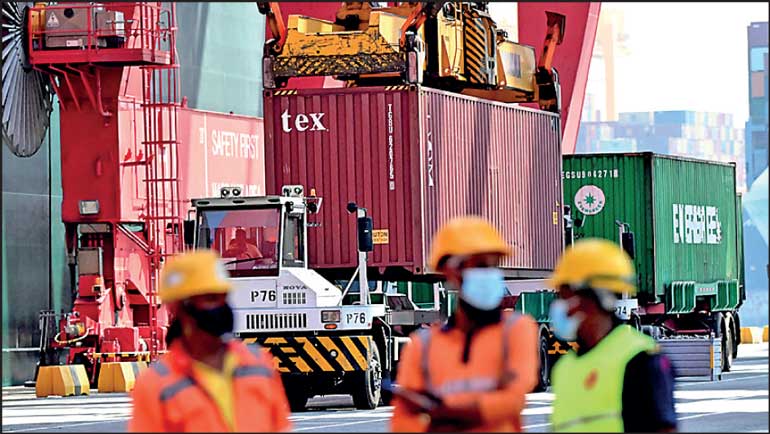Monday Feb 23, 2026
Monday Feb 23, 2026
Monday, 3 April 2023 00:43 - - {{hitsCtrl.values.hits}}

Reflecting the challenging times, the country’s imports in February have plunged to over two and half year low but in the process reducing the trade deficit by a hefty 95%.
As per the latest data from the Central Bank, imports in February amounted to $ 1 billion, the lowest since May 2020 (in 33 months) and half of the corresponding month in 2022.
CBSL said all major import sectors declined due to subdued aggregate demand conditions while the biggest intermediate goods category of imports saw a significant dip of 48% to $ 638 million. Consumer goods imports were down by 32% to $ 202 and investment goods declined 49% to $ 181 million.
The import volume and unit value indices declined by 36.8% and 13.7% (y-o-y), respectively, indicating a relatively higher contribution of the volume reduction on the decreased import expenditure.
Cumulative import expenditure in the first two months of 2023 was down by 37% to $ 2.4 billion.
Reinforcing its struggle, the export sector saw its performance down by 10% to 982 million from a year ago and a similar percentage decline in the first two months to $ 1.9 billion. The export volume and unit value indices declined by 2.9% and 7.5%, respectively (y-o-y), in February 2023, implying that the decline in export earnings in February 2023 was mainly driven by the price effect.
The trade deficit in February crashed to $ 39 million from $ 780 million from a year ago with CBSL attributing it to the impact of significant moderation of import expenditure due to subdued aggregate demand conditions. The cumulative trade deficit during January-February 2023 was $ 449 million, which was one third of $ 1.6 billion deficit in the corresponding period of last year.
Terms of trade, i.e., the ratio of the price of exports to the price of imports, improved by 7.2% in February 2023, compared to February 2022, as the decline in prices of imports surpassed the decline in prices of exports.
Detailing February imports, CBSL said Expenditure on the importation of CBSL said consumer goods declined in February 2023, compared to February 2022, driven by lower expenditure on both food and non-food consumer goods. Decline in expenditure on non-food consumer goods was broad-based but the drop in imports of home appliances; household and furniture items; and clothing and accessories was notable.
Expenditure on food and beverages also declined due to lower imports of cereals and milling industry products (mainly, rice), compared to February 2022. Expenditure on the importation of intermediate goods declined in February 2023, compared to a year ago, driven by lower imports of fuel and textiles and textile articles (primarily, fabrics). The importation of refined petroleum was significantly low due to the build-up of inventories while crude oil imports were not recorded in February 2023. The decline in textiles and textile articles was significant (the lowest since May 2020) implying a possible slowdown in garments exports in the period ahead.
Further, a sizable decline was recorded in the importation of base metals (primarily, iron and steel); chemical products (primarily, organic chemical elements); plastics and articles thereof (primarily, plastics in primary form); rubber and articles thereof (primarily, natural and synthetic rubber); and vehicle and machinery parts. However, expenditure on wheat, diamonds and precious stones and metals increased notably.
Import expenditure on investment goods declined significantly in February 2023, compared to the same month in 2022, resulting from a decline in all three investment goods subcategories, namely machinery and equipment, building material and transport equipment.
CBSL in February earnings from the exports of industrial goods declined 12% to $ 777 million with a substantial share of the decline being contributed by garments. It said reduced demand from major markets for garments due to unfavourable economic conditions globally mainly contributed to this outcome.
Earnings from rubber products continued to decline due to the lower exports of household rubber gloves. Similarly, earnings from the exports of petroleum products also declined due to the drop in volumes of bunker and aviation fuel exports despite the higher aviation fuel prices. In contrast, earnings from machinery and mechanical appliances (mainly, electronic equipment); and gems, diamonds and jewellery increased in February 2023.
Earnings from the export of agricultural goods marginally declined in February to $ 201 million since the increase in earnings from spices and tea was offset by the decline in earnings from coconut related products (primarily, fibres and desiccated coconut). Export earnings from spices improved due to higher export volumes of cloves; cinnamon; and nutmeg and mace. Increased earnings from tea exports were mainly due to price increases as the volumes registered a decline.
Earnings from mineral exports declined by 61% to $ 1.6 million in February 2023 mainly due to the decline in exports of titanium ores.